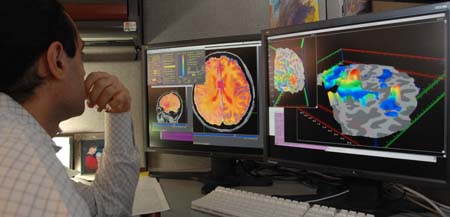
In a first-of-its-kind case involving academic property rights, a judge has ruled that control of a landmark project on Alzheimer’s disease belongs to the University of California, San Diego — handing the school a major victory in its lawsuit against the University of Southern California.
UC San Diego sued after Alzheimer’s researcher Dr. Paul Aisen and other employees defected to USC last month. The lawsuit alleges that USC, Aisen and eight other defendants conspired to illegally transfer the Alzheimer’s Disease Cooperative Study to the Los Angeles-based university. It accuses them of a variety of illegal acts, including contract interference, computer crimes and civil conspiracy.
Superior Court Judge Judith Hayes ruled on Friday that the project does indeed belong to UC San Diego, though she did not immediately decide on the school’s request for monetary damages, the Los Angeles Times reported.
“We are pleased with today’s decision and believe it indicates the strength of our overall case,” Dr. David Brenner, vice chancellor for UC San Diego’s health sciences, said in a statement, according to the Times.
Aisen resigned in June from UC San Diego, where he had overseen the study since 2007, to become founding director of an Alzheimer’s institute that USC is establishing. In recent weeks, the two sides have argued about who owns the database for the $100 million nationwide project.
Although universities commonly recruit or “poach” faculty from one another, lawsuits arising from those recruitments are rare. Richard Seligman, the associate vice president for research administration at Caltech who has more than four decades of experience dealing with grants, told the LA Times that he had never heard of such a lawsuit, even in a cutthroat funding environment where competition for grants and top researchers has grown fierce.
As Paul Basken points out in The Chronicle of Higher Education, “Among research universities a longstanding gentlemen’s agreement has held that a scientist who moves from one institution to another is allowed to carry any grant support along to his or her new home.”
Aisen and USC officials cited this academic tradition in the lawsuit, noting that it’s standard practice for departing faculty members to transfer their research to their new employer. They listed several other instances in which large grants, including center grants, were peacefully transferred between institutions after a faculty member’s move.
But UC San Diego, which has overseen the Alzheimer’s study for nearly a quarter of a century, said it still retains the government funding — an assertion backed by the National Institutes of Health. Under NIH rules, some grants (called “center grants”) are awarded to institutions, not individuals. So although it’s typical for a university to allow the transfer of a researcher’s individual grants to a new institution, that rule doesn’t usually extend to center grants awarded to specific institutions.
Speaking to this issue, Aisen told the Times: “We all lose here. Science and public health lose when research is torn from the investigators with the passion, knowledge and skill to assure its success.”
Some scientist have also expressed concern that the legal battle could impede the search for treatments to halt or reverse Alzheimer’s, a disorder that affects over 5 million people in the United States and ranks as a leading cause of death nationwide.
Meanwhile, the judge said she would issue a preliminary injunction early next week that will require USC to surrender custody of the Alzheimer’s project. She told USC not to manipulate data from the study or make any other changes to the database, which involves details of lab research clinical trials from dozens of sites across the country.
As the next step, the two universities and their lawyers will negotiate the choice of a “special master” to supervise the process of USC restoring full control of the database to UC San Diego, according to the newspaper. This phase will involve an independent expert on bioinformatics who can determine whether information in the database has been tampered with.
